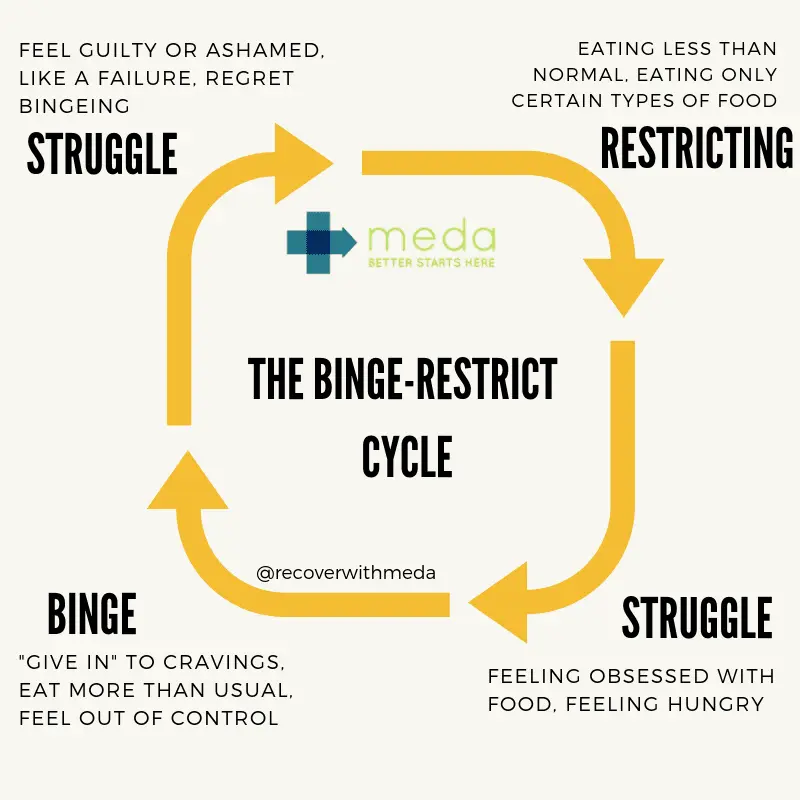Contents
😉 Greetings to regular and new readers. In the article “Eating Disorder: Causes, Types, Recovery” – general information on this problem. Video.
Types of eating disorders
Eating disorder (EE) or eating disorder is a psychogenic behavioral syndrome associated with eating disorders.
Research has shown that our understanding of eating disorders is gradually changing. The latest version of the Diagnostic and Statistical Manual of Mental Disorders, Dsm-5, has recently defined:
Compulsive overeating
This is the uncontrolled absorption of large amounts of food. A huge amount of food is eaten in a short time (from 30 minutes to 2 hours). You don’t feel full and you can’t stop eating!
How do you know if you are talking about an eating disorder and not just binge eating? With binge eating disorder, you feel a loss of control. The reaction to food is guilt, disgust, shame, insecurity. You overeat at least once a week for three months.
Binge eating often leads to obesity. This causes a number of health problems, including heart disease and cancer.
Anorexia
Previously, this disease was defined solely as a deliberate refusal to eat. But the new definition recognizes that a pathological fear of gaining weight, combined with a disfigured body image, leads to radical attempts to lose weight at any cost. In particular, through calorie restriction and excess physical activity.
Of all mental disorders, anorexia has the highest mortality rate.

Some people who struggle with anorexia die of starvation; others lay hands on themselves. Anorexia can also cause brain abnormalities, organ failure, and bone damage. And these are just some of the possible consequences.
Bulimia
When overeating is accompanied by attempts to avoid weight gain by inducing vomiting or using laxatives. This condition is diagnosed as bulimia nervosa.
Previously, doctors qualified bulimia as the presence of two cases of overeating and excess food intake per week. The new definition reduces their number to one per week.
Bulimia is a problem in adolescence. In about 90% of cases, girls aged 16 to 23 are affected.
Overeating and forced cleansing of the consumed food leads to electrolyte imbalance. It can cause a heart attack, stroke, or ultimately death. In addition, stomach acid destroys tooth enamel.
Eating disorders are not a lifestyle choice
On the outside, some eating disorders can look like vanity that’s out of control. But this phenomenon is more complex than the desire to imitate supermodels. As you know, a combination of genetic, psychological, biological, behavioral and social factors plays an important role.
So recent research shows that, for example, genetic changes can lead to overeating in adolescence. Brain activity differs in patients with anorexia. People with the “apple” body type have a greater susceptibility to overeating and a tendency to impulse food choices.
The emotional factor adds fuel to this fire. A culture based on constant comparison quickly spreads feelings of dissatisfaction with one’s body.
When you have an eating disorder, the chances of getting associated psychological problems skyrocket. This is, first of all, about a tendency to depression or atypical mood swings.
The risk of obsessive-compulsive disorder is also on the rise, the researchers say. In addition, patients are four times more likely to have alcohol and drug abuse.
These statistics are alarming, as each factor amplifies the other. This is why treatment that focuses on the person as a whole, not just the eating disorder they are suffering from, is critical.
Recovery from eating disorders
If you’ve ever doubted that eating disruption is serious, think about it. In general, there are many reasons to worry about an eating disorder. In any case, do not ignore them or treat them as something frivolous.
Dealing with an urgent problem or trying to help someone can create feelings of hopelessness, loss of control, and fear. However, today there are a variety of remedies for their treatment. Full recovery is real.
In particular, there are medications designed to stabilize mood or aimed at solving related problems. There is psychotherapy that can help patients become aware of and change distorted attitudes.
Regardless of the type, treatment should be based on the unique experience of each person suffering from eating problems.
Video
See here for more information on the topic: Eating Disorder (Eating Disorder)
Friends, we are waiting for your advice from personal experience (eating disorder). 😉 Share this information on social networks.









